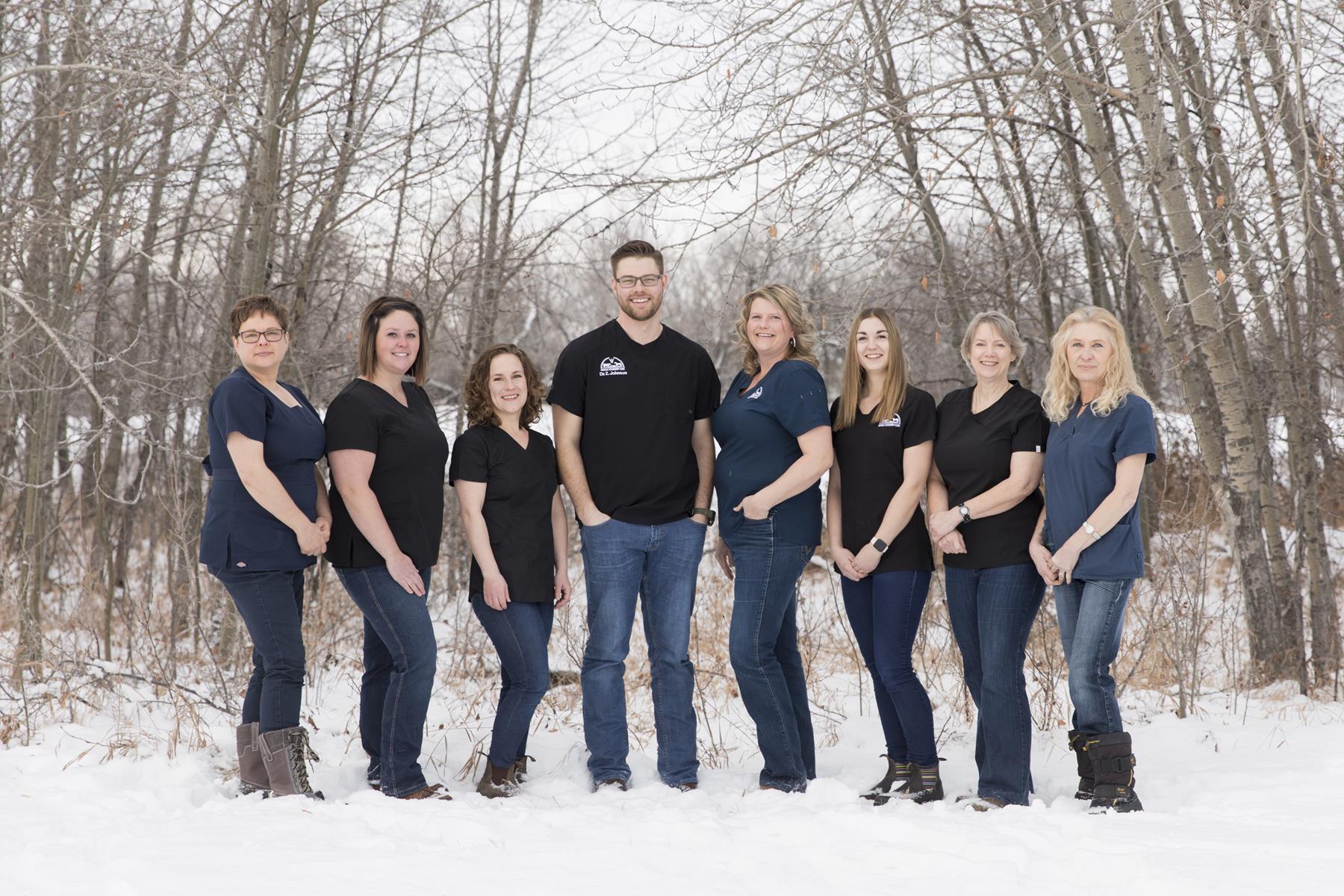
Growing a practice in rural Saskatchewan
Jumping into ownership wasn’t the original plan that Dr. Zachary (Zach) Johnson had in mind when he was initially accepted into the Western College of Veterinary Medicine (WCVM).
By Katie Brickman-YoungJust one month after receiving his Doctor of Veterinary Medicine (DVM) degree in 2016, Johnson purchased the business and became the new owner of the Melville Veterinary Clinic in Melville, Sask. The previous owner, Dr. Dale Cochrane, is also a graduate of the WCVM (1975) who later retired in May of 2017.
“For the first eight months, I don’t remember not coming to work [and] not feeling ill in the morning,” says Johnson. “[I remember] just being nervous and flying by the seat of my pants. The previous owner stuck around, which was helpful as my wife and I gained control of the practice.”
Born and raised in Regina, Sask., Johnson planned on specializing in canine surgery when he enrolled at the regional veterinary college at the University of Saskatchewan (USask). But the exposure to large animal medicine through the DVM curriculum and the friends he made got him interested in the agriculture community. Johnson also gained valuable experience working as a third- and fourth-year student with Cochrane and his clinic’s team.
By the time he finished the four-year program, Johnson changed direction to become a mixed animal practitioner. Five years after graduating, he’s happy that he opened himself up to different options in school, allowing him to work with both large and small animals in his practice in rural Saskatchewan.
“I like the variation and being able to do other things — not being stuck in one species all day is nice,” he says.
Johnson and his classmates' education at the WCVM prepare them for the day-to-day medical foundation of veterinary practice. Still, a lot of the learning happens on the job, especially on the business side of ownership.
“I think the WCVM gives you a really good foundation with basic skills and general knowledge of the diseases and the processes that go with those,” he says. “When you go out into practice, not everything follows the textbook by any means, but you have a solid base to start with.”
Johnson's path may not have been the traditional one, but after five years of growing and learning, he feels like he is in a better position and is excited about some of the changes coming to the clinic.
“It was an abrupt transition, to say the least, but it has been gratifying, and I have grown a lot since having to go through those trials and tribulations that come with that transition,” he says.
Johnson and his wife Kylie are working on renovations to the clinic’s original building, which will allow their business to offer more services to the Melville and area community.
“In the community, I want this to be a place that people are comfortable bringing their animals to, but [they] also see us as a leader in the community and a business that gives back,” he says. “I don’t want to be the business that takes and never gives, so we are trying to be more involved.”
The days are long in the clinic, and once you add in some emergency cases, daily life can be hectic for a mixed animal practitioner. Johnson and his wife are focused on creating a healthier work environment for all employees at their clinic.
“Wellness has become such a huge thing with new graduating veterinarians, and current vets want to have a life. They don’t want to work an 80- or 90-hour work week but are willing to work hard as long as there is some balance,” he states.
“We are trying to create an atmosphere in the clinic where we have fun and everyone enjoys coming through the door in the morning … you have a good balance where you can go out and do the things you want to do. But when [we’re] in the office, we are working hard and doing a good job.”
The local community has welcomed the couple who have connections to the area. Kylie’s family is from Saltcoats, about 45 minutes east of Melville. Johnson attended the Yorkton Regional High School while playing AAA Midget Hockey in his Grade 12 year.
“I like the familiarity with people in town — you get to build that relationship with people, and you get to know the people and their history, their families and their pets on a personal level,” says Johnson.
“Creating that connection with the client is not just about business and animals; there are people behind all of that. Getting to know the people [behind] the animals we care for is a big reason as to why I like being a rural mixed vet.”
Click here to read how the Government of Saskatchewan is enhancing support for veterinary services in rural Saskatchewan communities.
